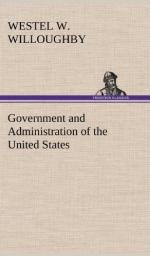These three main points being settled by compromises, other parts of the government, such as a single chief executive, a Federal judiciary, and the decision as to what powers should be given to the President, what to the Senate, and what to the House, were more easily arranged, and the convention adjourned September 17, 1787, having been in session a little over four months. Thus was prepared the Constitution under which we are now living—an achievement declared by Guizot to be the greatest work of its kind, and by Gladstone to be the greatest work ever struck out at one time by the hand of man.
The Constitution having been agreed to in convention, it was now submitted to the vote of each of the colonies for acceptance. It was decided in this convention that it should be considered as ratified, and should go into effect as soon as accepted by nine of the thirteen States.
The adoption or rejection of the Constitution now became a question which claimed the entire attention of the States, and it is during this contest that we find the origin of the first political parties in the United States. Those favoring the adoption of the Constitution were called “Federalists” and those opposing it “Anti-Federalists.”
_#Arguments For and Against Adoption.#_—The Federalist party was composed of those men who were desirous of a strong central government, and for this reason favored the Constitution. This party was especially strong in New England, largely because New England, being the commercial part of the colonies, had had the lamentable weakness of the old confederation brought home to them the more forcibly by the disorganization and loss of commerce which the Continental Congress had been unable to regulate.
The Anti-Federalists were those who wished the State governments to be kept strong, and that there should be a comparatively weak central government.
The argument used by the Federalists for the adoption of the Constitution was, that only by correcting all those defects of the Confederation which have been pointed out, could order and prosperity be restored to the country. They said that the Constitution, being a series of compromises, could not please everyone in all respects, but that it was the best that could be obtained under the circumstances. Their arguments appeared in a remarkable collection of eighty-five essays, called the “Federalist,” written by Alexander Hamilton in company with John Jay and James Madison. In these were explained all the points of the Constitution, and to this day they remain the best exposition of the Constitution ever written.




